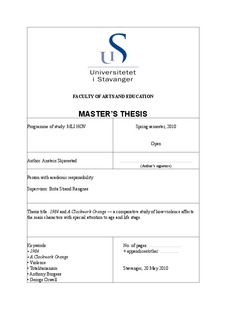1984 and A Clockwork Orange : a comparative study of how violence affects the main characters with special attention to age and life stage.
Master thesis

Åpne
Permanent lenke
http://hdl.handle.net/11250/185382Utgivelsesdato
2010Metadata
Vis full innførselSamlinger
- Student papers (HF-IKS) [905]
Sammendrag
This main aim of this thesis is to review how violence affects the main characters in 1984 and A Clockwork Orange; what kinds of violence affect Winston and Alex respectively, and what causes it. We shall first go into the nature of violence more in general, and find out what violence really is and how violence can be connected to the analyses of the novels. First, we shall provide a definition of violence, second, we will present different perceptions of violence, third, we are interested in finding out whether violence is an inborn human characteristic or a social construct. We shall review certain philosophical notions on violence, along with some historical ones.
When doing a literary analysis of two very distinct characters, it can be useful to also visit some psychological aspects as well. Especially in connection to whether violence is inborn or not, some biological aspects of violence must be reviewed. The third aspect of the background chapter is to revise potential outside factors that may affect violence.
During the course of this thesis we shall see that violence affects the main characters in 1984 and A Clockwork Orange to a great extent. Violence seems to function as motif in both novels. 1984 is set in an extremely totalitarian society where the individual is always put second. Winston realises that the Party is to blame for all of his hardships. He remembers a time when life was different, he remembers a life that was different from the life Big Brother dictates him. Due to the frustration the totalitarian society invokes in him, Winston has no other choice than to revolt. His revolt and willingness to do the most dreadful acts in order to ruin the structure of the Party is a result of that. In that manner, revolt through violence becomes a human characteristic. Winston’s violence, on the other hand, is learned.
Winston’s age plays a central part in this because of his knowledge of an alternative to life and his awareness that the Party, the totalitarian movement in 1984, is causing him the hardships he endures. Up until Winston’s arrest, violence in 1984 is mostly on the political ideological level. Till then, there are not many examples of physical violence in the novel. It is the clear and present threat of violence that is the underlying oppressive factor in 1984. That, however, is also violence.
iv
When Winston is arrested, violence changes from being a tacit threat to real violence. Winston is tortured in the most gruesome ways, and the time he spends in prison is the unprecedented record of subjective violence in the totalitarian society in 1984. The threat of violence now manifests itself when Winston is interrogated. Violence now becomes more real, physical, and brutal. O’Brien is Winston’s chief interrogator, and when he gets involved, the violence Winston suffers has a clearly identifiable agent. The system, the society is to blame for both Winston’s violence, but also the violence he endures throughout the whole of the novel.
Alex too grows up in a totalitarian society. Although not quite as totalitarian as the society in 1984, the society in A Clockwork Orange is growing towards totalitarianism. Unlike 1984, the violence in A Clockwork Orange is physical from the first page. Alex is part of a youth generation that is extremely violent. This violence may stem from a youth rebellion, but as the novel progresses, and as we shall see in the analysis of the novel in this thesis, violence in A Clockwork Orange is not really subjective. Youth violence is part of a system, and part of everyday life, and that makes violence in A Clockwork Orange objective. The violence the teens are responsible for is similar to the violence the growing totalitarian government uses in response, thus making only more violence.
Apart from growing up in a totalitarian rule, we shall see that certain outside factors may help facilitate violence. Such factors include group violence, power, crowding, drug abuse, and the nature of adolescence in connection to violence. In addition, by being violent Alex seeks out his free will. Being good is not a choice but an order, being bad is therefore a choice and becomes the manifestation of Alex’s humanity and freedom of choice.
The most important factors behind Alex’s violence, however, are Alex’s need to belong, cry for recognition, and the frustration he suffers because of society’s resistance in letting him in. The need to belong overshadows every principle, and Alex succumbs the power of the totalitarian machine. Similar to 1984, violence in A Clockwork Orange is majorly caused by the wrath of totalitarianism; the political direction of society.
Beskrivelse
Master's thesis in Literacy studies